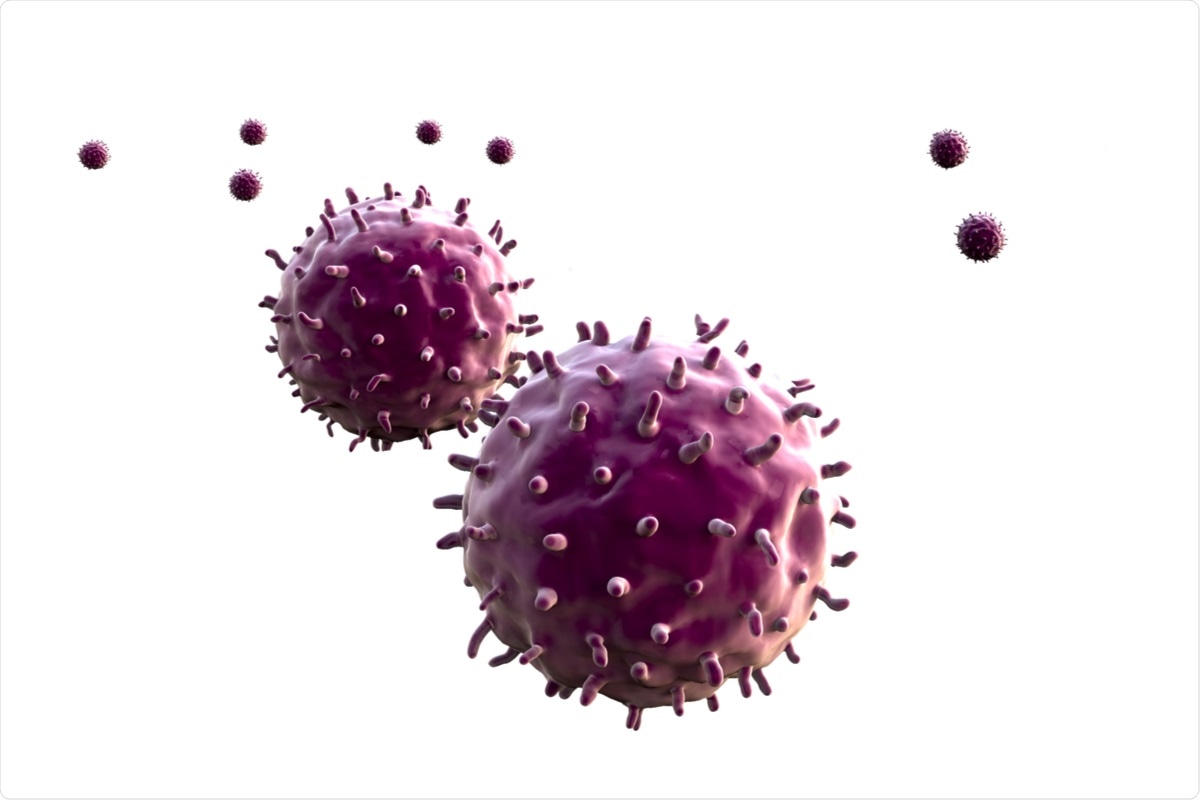There have been multiple factors that have been attributed to disease severity for coronavirus disease (COVID-19), many of which depend on the age and gender of individuals. For example, several inflammatory cytokines like interleukin-6 (IL-6) or chemokines like interferon-inducible protein 10/IP-10 (CXCL10), as well as impaired interferon responses have been linked to a poor prognosis and severe disease.

Study: T cell apoptosis characterizes severe Covid-19 disease. Image Credit: UGREEN 3S / Shutterstock.com
Background
Lymphopenia is a hallmark for COVID-19 observed in up to 63% of COVID-19 patients. A defect in Th1 cell immunity and T-cell depletion in lymphoid tissues, which are also associated with apoptosis, have also contributed to poorer disease outcomes in COVID-19 patients.
Apoptotic cell death involves both the extrinsic and intrinsic pathways. Whereas the extrinsic pathway of apoptosis involves death receptors such as CD95/Fas or TRAIL, intrinsic pathways are often associated with members of the Bcl-2 family.
Although CD95 engagement by its counterpart FasL has a minor impact on T-cells from healthy donors, Th1 cells and activated T-cells are more prone to dying through Fas/FasL interaction. As seen in patients with human immunodeficiency virus (HIV) infection, T-cells are highly sensitive to FasL-mediated cell death, in which caspase activation is critical.
In a recent Cell Death & Differentiation study, researchers analyze the levels of sFasL and CD95/Fas relative to the probability of T-cell apoptosis in patients with severe COVID-19 who were admitted to the hospital.
About the study
A total of 41 patients who tested positive for the severe acute respiratory syndrome (SARS-CoV-2) by reverse-transcriptase polymerase chain reaction (RT-PCR) assay were enrolled in the current study. Eleven of these participants were admitted to the intensive care unit (ICU) for severe infection and acute respiratory distress syndrome.
Thirty of the study participants were admitted to the Infectious Diseases Department (non-ICU) for symptoms of dyspnea and/or deterioration in their general condition. Out of these patients, 14 age- and sex-matched healthy controls were used as negative controls, and their ages varied between 28 and 95 years.
Study findings
The researchers observed a significant reduction in both CD4 and CD8 T-cell counts in patients admitted in the ICU as compared to those admitted to healthy controls. There was also a gradual decline in the secretion of Th1 cytokine IFN-γ in relation to the status of COVID-19 severity, which was consistent with previous reports.
Higher expressions of CD95/Fas on memory (CD45RAneg) T-cells, including both CD4 and CD8 T-cells, were not related to higher immune activation in COVID-19 patients as compared to healthy controls. Interestingly, both ICU and non-ICU patients exhibited higher levels of CD95/Fas expression as compared to healthy controls. These levels were positively correlated with CD4 T-cell numbers; however, CD20+ B-cells did not express higher levels of CD95.
The researchers also quantified plasma levels of sFasL and tumor-necrosis factor (TNF)-related apoptosis-inducing ligand (TRAIL). Plasma concentrations of sFasL increased more in ICU than in healthy controls and were high in half of the non-ICU patients.
This was not in the case of TRAIL, which indicated a negative correlation between CD4 T-cell numbers and concentrations of sFasL, whereas only a trend was observed for CD8 T-cell numbers. A similarly negative correlation was observed between CD95/Fas and CD4 T-cell numbers. Taken together, these results demonstrated a high level of plasma sFasL and CD95/Fas in COVID-19 patients, both of which are associated with T-cell lymphopenia.
Researchers further demonstrated a negative correlation between CD4 T-cell counts and caspase activity in both CD4 and CD8 T-cells, and no correlation between the caspase activity of CD8 T cells and CD8 T-cell counts. This suggested a possibility of abnormal apoptosis of CD8 T-cells being the consequence of CD4 T-cell death in COVID-19, thus shortening CD8 T-cell survival.
Considering that COVID-19 is characterized by inflammation, where CXCL10 expression correlated with disease severity, the researchers evaluated 32 soluble factors in the plasma of COVID-19 patients. Plasma levels of CXCL10, IL-1Ra, hepatocyte growth factor (HGF), and soluble CD14 (sCD14,) were key differentiators for disease severity between ICU and healthy patients with the area under the receiver operating characteristic curve (AUC) being 0.98.
Q-Vd, which is a pan-caspase inhibitor, demonstrated higher levels of Th1 transcripts IFN-γ and TNF-α in activated T-cells in comparison with untreated cells. Q-VD also prevented the death of T-cells incubated in the presence of recombinant sFasL that were shown to be active in inducing the death of Jurkat cells. Thus, CD4 and CD8 T-cell apoptosis were significantly reduced by more than about 52.2% and 24.2%, respectively.
Implications
The current study established a positive correlation between plasma levels of sFasL, CD95/Fas expression on T-cells, and T-cell apoptosis in COVID-19 patients. Furthermore, the expression of Bcl-2 family members was modulated in T-cells, which as correlated with the extent of lymphopenia and CXCL10 associated with disease severity in COVID-19 patients.
Furthermore, the current study demonstrated a strategy aiming to block caspase activation using Q-VD that can prevent lymphopenia, improve competent immune cell survival, and prevent fatal outcomes in COVID-19 patients.
- André, S., Picard, M., Cezar, R., et al. (2022). T cell apoptosis characterizes severe Covid-19 disease. Cell Death & Differentiation. doi:10.1038/s41418-022-00936-x, https://www.nature.com/articles/s41418-022-00936-x
Posted in: Medical Research News | Disease/Infection News
Tags: Acute Respiratory Distress Syndrome, Apoptosis, Assay, CD4, Cell, Cell Death, Chemokines, Coronavirus, Coronavirus Disease COVID-19, CXCL10, Cytokine, Cytokines, Dyspnea, Growth Factor, HIV, Hospital, immunity, Immunodeficiency, Infectious Diseases, Inflammation, Intensive Care, Interferon, Interleukin, Interleukin-6, Ligand, Lymphopenia, Necrosis, Polymerase, Polymerase Chain Reaction, Protein, Respiratory, SARS, SARS-CoV-2, Severe Acute Respiratory, Severe Acute Respiratory Syndrome, Syndrome, T-Cell, Tumor, Virus

Written by
Sreetama Dutt
Sreetama Dutt has completed her B.Tech. in Biotechnology from SRM University in Chennai, India and holds an M.Sc. in Medical Microbiology from the University of Manchester, UK. Initially decided upon building her career in laboratory-based research, medical writing and communications happened to catch her when she least expected it. Of course, nothing is a coincidence.
Source: Read Full Article
